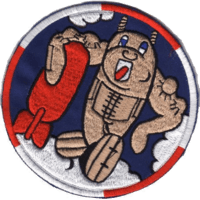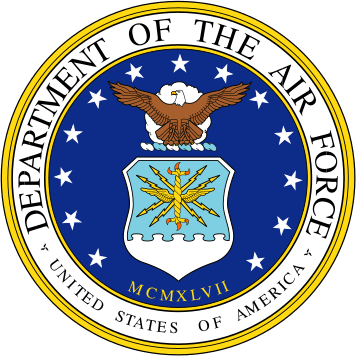55th Air Refueling Squadron
| 55th Air Refueling Squadron | |
|---|---|
|
55th Air Refueling Squadron Patch | |
| Active |
1 July 1943 – 17 October 1945 1 November 1950 – 18 February 1954 1 October 1955 – 15 March 1963 28 October 1994 - 31 March - 2009 |
| Country | United States |
| Branch | United States Air Force |
| Type | Aerial refueling |
| Part of |
Air Education and Training Command 19th Air Force 97th Air Mobility Wing 97th Operations Group |
| Garrison/HQ | Altus Air Force Base |
| Nickname(s) | Monkeys |
| Motto(s) | Masters of the Art |
| Decorations |
|


The 55th Air Refueling Squadron (55 ARS) was a part of the 97th Air Mobility Wing at Altus Air Force Base, Oklahoma. It formerly operated both the Combat Crew Training School and Central Flight Instructor Course for KC-135 Stratotanker aircrew qualification training.
Mission
The squadron's mission is training of active duty, guard, reserve, and international KC-135 crewmembers.[1]
History
The 755th Bombardment Squadron had been activated on 1 July 1943, at Wendover Field, Utah. Beginning in 1944, the 755th was stationed at RAF Horsham St. Faith, England. During 1944 and 1945, the 755th flew B-24 combat missions in the European Theater of Operations earning seven campaign streamers and the distinction of being the test squadron for the Army Air Forces' first guided bomb project.[1]
The 55th was reactivated on 1 November 1950. It was originally equipped with KB-29M tankers and was assigned to the 55th Strategic Reconnaissance Group at Ramey Air Force Base, Puerto Rico. On 10 October 1952, the squadron moved to Forbes Air Force Base, Kansas, as part of the 55th Strategic Reconnaissance Wing. Two years later, on 16 February 1954, the squadron moved to Lincoln Air Force Base, Nebraska, where it was inactivated two days later.[1]
The 55th Air Refueling Squadron was again reactivated on 1 October 1955, and assigned to the 55th Strategic Reconnaissance Wing at Forbes Air Force Base, Kansas, and was re-equipped with KC-97 Stratotanker aircraft. First introduced into the Air Force inventory in 1951, the tanker could fly fast enough to refuel the B-47 bomber, thus providing the Air Force with an intercontinental strike capability.[1]
The squadron deployed to Ernest Harmon Air Force Base, Newfoundland, from 31 October through 27 December 1956 in response to the Suez Canal crisis. During this period, the squadron participated in giant simulated combat missions involving 1,000 B-47s and KC-97s, demonstrating the United States' resolve and intercontinental war fighting capability. The deployment was instrumental in the squadron winning an Air Force Outstanding Unit Award for the period July 1956 to November 1957. During the 1959 Strategic Air Command bombing competition, the largest held to date, the 55th again demonstrated its combat readiness by winning the Saunders Trophy as the best air refueling unit in Strategic Air Command. The squadron was inactivated again in 1963.[1]
On 28 October 1994, the 55th Air Refueling Squadron was activated as part of the 97th Air Mobility Wing at Altus Air Force Base, Oklahoma. The 55th Air Refueling Squadron, along with the 54th Air Refueling Squadron, were once the only two Air Education and Training Command KC-135R flying training squadrons. Both squadrons provided KC-135R initial and advanced flight qualification. On 31 March 2009, the 55th Air Refueling Squadron was inactivated,[1] leaving the 54 ARS as the lone remaining AETC KC-135 unit.
Operations[2]
- World War II
Lineage[2]
- 755th Bombardment Squadron (Heavy) (1943)
- 755th Bombardment Squadron, Heavy (1943–1945)
- 755th Bombardment Squadron, Very Heavy (1945–1950)
- 55th Air Refueling Squadron, Medium (1950–1985)
- 55th Air Refueling Squadron, Heavy (1985–1994)
- 55th Air Refueling Squadron (1994–2009)
Assignments[2]
- 458th Bombardment Group (1943–1945)
- 55th Strategic Reconnaissance Wing (1950–1954, 1955–1963)
- Attached: 8th Air Force (31 October - 27 December 1956)
- 97th Air Mobility Wing (1994–2009)
Bases stationed[2]
|
|
Aircraft Operated[2]
- B-24 Liberator (1943–1945)
- B-29 Superfortress (1945)
- KB-29 Superfortress (1950–1954)
- KC-97 Stratotanker (1955–1963)
- KC-135 Stratotanker (1994–2009)
References
![]() This article incorporates public domain material from the Air Force Historical Research Agency website http://www.afhra.af.mil/.
This article incorporates public domain material from the Air Force Historical Research Agency website http://www.afhra.af.mil/.
- Maurer, Maurer, ed. (1982) [1969]. Combat Squadrons of the Air Force, World War II (PDF) (reprint ed.). Washington, DC: Office of Air Force History. ISBN 0-405-12194-6. LCCN 70605402. OCLC 72556.



